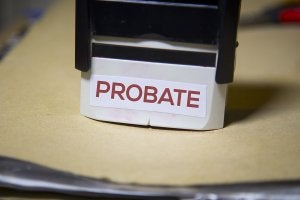-
What Is an Heir Apparent?
If a close family member has passed away, then it is in your best interests to consult a will attorney in The Woodlands. A will attorney can help you determine whether you may be an heir or an heir apparent. This designation is significant when the decedent has died without a will or living trust, or where the will may be proven to be invalid.
To find out whether you’re an heir or an heir apparent, you may watch this video or consult your will attorney. Usually, a deceased individual’s surviving spouse and children are the heirs. An example of an heir apparent might be a living grandchild. The heir apparent might stand to inherit part or all of the estate, but this will only happen if there are no living heirs.
-
What Is Power of Attorney?
Power of attorney is a designation that allows someone to make decisions for someone else—to act on their behalf. Generally speaking, when a person becomes incapacitated, he or she is no longer able to make legal and financial decisions on his or her own behalf. In such cases, a power of attorney can serve as a useful tool. It is possible for the court in Houston to appoint someone to make these decisions for the individual, but this is usually not the preferred situation as it is both cumbersome and costly. By designating power of attorney to a close family member or friend, the afflicted individual will have peace of mind knowing that, in the event of incapacitation, important decisions will be made by a trusted person.
When someone is granted power of attorney, the designation may go into effect immediately or it may not go into effect until the grantor becomes incapacitated. Be careful, individuals who hold another’s power of attorney have a legal duty to act in good faith when managing the grantor’s financial assets and legal matters. It is possible for legal action to be taken if a person with power of attorney is alleged to have mismanaged the grantor’s affairs.

-
Probate Spotlight: Disputing an Inheritance
The act of contesting a will in The Woodlands is often seen in an unfavorable light. Opinionated individuals may feel that contesting a will is disrespectful to the decedent, or is, perhaps, little more than an attempt to obtain more financial assets. In fact, estate law does allow legal grounds for challenging a will, with good reason. People who are elderly, in poor health, or otherwise vulnerable may be taken advantage of by non-family caregivers or other individuals. So when a will truly isn’t valid, then the rightful beneficiaries may not receive the inheritance that the decedent desired.
Time Limits

If you suspect that your loved one’s will is invalid, it’s always in your best interests to consult an estate lawyer right away. There are certain time limits to contesting a will. If you know that you are an heir, the deadline is two years from the date that the will was admitted to probate. If you didn’t know that you are an heir, such as if you’ve only recently discovered your birth parents, you have four years to file a challenge from the date at which the estate was closed. Minors must file a challenge within two years from the date of their majority.
Improper Execution
One of the grounds for challenging the validity of a will is that the document was improperly executed. For example, if it is a holographic will, it might not have been written entirely in the decedent’s handwriting. If it is an attested will, it might not have been signed by the necessary witnesses, or that the witnesses were disqualified by law from acting as witnesses.
Undue Influence
Wills are intended to carry out the wishes of the decedent after his or her death, but sometimes they can be unduly influenced by other parties. Your attorney may argue that the will is invalid because another person used his or her influence to undermine or overpower the decedent at the time that he or she signed the will.
Testamentary Incapacity
In order for a will to be valid, the testator must be of sound mind at the time of the signing. Your attorney may use medical records and other types of evidence to argue that the decedent was mentally incapable of understanding the effect of the will, the extent of the property, and other aspects of will creation.
-
Creating a Will
Some of the most important decisions you’ll make naturally are those which influence the creation of your will. When you consult an estate planning attorney in The Woodlands, you’ll receive sound legal guidance on what to include in your will , how to choose an executor of your will, and how to reduce the risk of a contested will. Of course, when the time comes, the attorney can also probate the will.
When you watch this video, you’ll hear some factors you should consider when it’s time to create your will. This financial adviser recommends naming contingent beneficiaries in addition to primary beneficiaries, just in case the primary beneficiaries pass on before you. You should update your will whenever you experience substantial life changes.
-
How to Keep Your Will from Being Contested
It’s often thought that following a death, an individual’s will is always executed according to his or her wishes. But in fact, some heirs in The Woodlands may challenge the will. A contested will can result in potentially irreversible damage to family relationships and if the will is found to be invalid, the decedent’s wishes may not be respected. To prevent a contentious will contest , you should seek the counsel of an experienced estate planning attorney.
Hire an Attorney

One reason why a survivor of the decedent may challenge a will is because it was improperly drafted, or, perhaps, no one properly witnessed the decedent as he or she signed the will. By hiring an attorney to create your will for you, you can significantly reduce the risk that it will be declared invalid. Texas law recognizes two basic types of wills. Holographic wills are entirely handwritten by the individual. Holographic wills do not need to be signed by witnesses, although two witnesses will be required to prove the individual’s handwriting after the death. More commonly, residents of Texas create attested wills, which are typed written. You can make your attested will valid by signing it in the presence of at least two witnesses who are over the age of 14 and who have no interest in the estate.
Including a No Contest Clause
Although it can help, a “no contest” clause is not a foolproof way to prevent a will contest. You can instruct your attorney to include this clause in your will. This clause provides for the disinheritance of anyone who unsuccessfully challenges your will. Unfortunately, Texas courts are reluctant to enforce such clauses in certain instances where a will contest is filed in good faith.
Explain Your Choices
Wills may be contested when one or more beneficiaries become disgruntled with their share (or non-share) of the estate. In short, a will contest is often a way of attempting to obtain more of the money from the estate, or to obtain a particular prized family heirloom. If you feel that your decisions may be deemed controversial among your survivors, then you may decide to explain these choices within the text of the will or even by video at the time of the will signing. A less aggressive option might be to choose to discuss the matter directly with your beneficiaries so that they will understand your choices after your death.
-
How to Write a Living Will
A living will is an important document that not only protects your estate but also ensures that your wishes are honored in the case of a medical emergency. To make sure that your living will is executed properly, it is necessary to get the assistance of a will attorney in The Woodlands .
Watch this video to learn about the medical directives that can be included in a living will. These directives include your wishes for life support and resuscitation should you enter a vegetative state or suffer a severe injury. Because of the complexity of these issues and the need to be very specific about potential scenarios, having an experienced lawyer is crucial to protect your living will from challenges.
-
Understanding the Basics of a Trust
Trusts are estate planning tools that are used to transfer property to someone to manage it on behalf of the property owner for a beneficiary. Trusts can be helpful in keeping all or part of an estate out of probate, saving beneficiaries a great deal of time and money. As with all parts of estate planning, it is crucial to work with a will lawyer in Houston when setting up a trust to make sure it is properly executed.
When a trust is established, the beneficiaries and the trustee who will manage it must be identified. The trustee is obligated to manage the trust solely for the benefit of the beneficiaries. Failing to do so means that the trustee could be removed. Trusts can be used in conjunction with a will or instead of one, depending on your individual estate planning needs. Your will lawyer will consider many different factors, including the size of your estate and your designated beneficiaries, to help you decide how trusts can factor into your overall estate plan.

-
Reasons to Contest a Will
If you are concerned that a loved one’s will does not accurately reflect his or her final wishes, you can choose to challenge the will in court. The first step is to contact an attorney who can walk you through how to contest a will in Houston and help you determine if you have legal grounds for your challenge. There are several different reasons you can opt to contest a will, from concerns about your loved one’s mental state to worries about forgeries. Here is a look at some of the most common reasons why people decide to contest a will.
Lack of Testamentary Capacity

Testamentary capacity refers to the legal and mental ability to create or change a will. If a person does not have a testamentary capacity, then the will in question is not valid. If you are concerned that your loved one did not have testamentary capacity, you must show that he or she did not understand the value of the property in question, who the beneficiaries are, and what having a will actually means. There are many reasons why someone may not have testamentary capacity when a will is made, including mental illness and dementia. People who make wills while under the influence of drugs and alcohol also lack testamentary capacity in the eyes of the courts.
Undue Influence
Any time a vulnerable person is under undue pressure to make certain provisions in or changes to a will, he or she is said to be under undue influence, and the will may not be valid. Typically, this involves someone manipulating a vulnerable person to receive a larger portion of the estate. The influence or pressure can come in the form of physical or emotional abuse or coercion.
Newer Will
The latest version of a will is always the one that is considered to be binding. If your loved one made changes to his or her will, but the executor is trying to enforce an older version, you can file a challenge to ensure that the newest one is being honored.
-
What to Expect from the Probate Process
The probate process is perhaps among the least understood aspects of estate planning. It can be complex and it may be a prolonged matter that takes months to complete. However, the steps of the process can actually be clearly defined. When you hire a probate lawyer serving The Woodlands, he or she will explain the probate process to you and answer any questions you may still have.
File the Petition

The first step in the probate process is to file a petition in probate court and provide notice to the heirs. If the individual died with a will, then the petition will seek to admit the will to probate and appoint the executor. If the individual died intestate, the petition will seek to appoint an administrator for the estate. All of the heirs and beneficiaries will be provided with notice and a notice about the probate hearing will usually be published in the local newspaper. This allows beneficiaries to voice objections in court.
Give Notice and Take Inventory
Once the executor is appointed by the court, he or she must notify all creditors of the estate. Creditors must make a claim within a certain period of time. Then, the executor will take an inventory of the estate property. The inventory includes real property, stocks, business interests, and other assets. The estate may need to hire an independent appraiser to assess the value of non-cash assets.
Pay Claims
The next step in the probate process is to pay claims. The executor will determine which claims against the estate are legitimate. Those will be paid and other expenses, such as funeral expenses, will be paid. It may be permitted to sell estate assets if this is necessary to pay these obligations.
Distribute Property
Once all legitimate claims have been satisfied and the waiting period to file claims has expired, the executor will ask the court for the authority to transfer the remaining assets. If the individual died with a will, the assets will be transferred in accordance with those specifications. If the individual died intestate, the assets will be transferred in accordance with the state intestate succession laws.
-
How Are Heirs Determined in Texas?
When a family member passes away, the surviving relatives must turn to a will or a probate court to determine how the deceased’s property should be distributed. To receive property, in the absence of a will, Texas probate law requires that you prove that you are a legitimate heir. To go through this process, it is often helpful to hire a probate lawyer in The Woodlands to assist with your case. Here is what you need to know about establishing yourself as an heir under Texas probate law.
Wills

A will is the most straightforward way to determine who is a legitimate heir. If there is a will in place, and no one contests it, then the will should state very clearly who the deceased intended to be an heir to his or her estate. If someone is not named as an heir in the will, then it is not possible to prove in court that he or she has a legitimate claim on being an heir without challenging the will. Challenging the will means proving that there is a legal reason it should not be considered binding.
Heirship Applications
If there is no will in place, then the estate will be decided in probate, and everyone who believes he or she should be considered an heir must file an application. Before heirship applications can be accepted, the potential heirs must establish that the deceased died without a complete will and that he or she had property in the state of Texas. There must also have been no administration of the estate, or, in cases where there was will, property must have been left out of the will. If these requirements are met, the applications for heirship can be submitted in a county in which the deceased owned property. The applications request information about the potential heirs and their relationships with the deceased. All potential heirs must sign the application, and if there are heirs that cannot be located, an ad must be placed in the paper to attempt to locate them. The court then uses this information to determine how to allocate the estate appropriately.
RECENT POSTS
categories
- Uncategorized
- Estate Planning
- Probate
- Family Law
- Drafting a Will
- Divorce Lawyer
- Texas Family Law
- Divorce
- Real Estate
- Probate Court
- Child Custody
- Andrew J. Bolton
- Esq.
- Adoption
- Law Office of Andrew J. Bolton
- Wills
- Executor
- Infographic
- Guardianship
- Trusts
- Contested Divorce
- Child Support
- Attorney
- Living Wills
- Contested Will
- Prenuptial
- Probate Bond
- Heir Apparent
- Legacy Contact
- Living Trusts
- legal guardian
- Legal Disputes
- property rules
- Common Law
- Stocks
- Estate Tax
